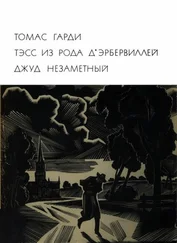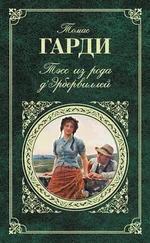| "You are all better than I." |
- Вы все лучше меня. |
| "We better than you?" said the girls in a low, slow whisper. |
- Мы лучше тебя? - шепотом переспросили девушки. |
| "No, no, dear Tess!" |
- Нет, нет, милая Тэсс! |
| "You are!" she contradicted impetuously. |
- Лучше! - возразила она настойчиво. |
| And suddenly tearing away from their clinging arms she burst into a hysterical fit of tears, bowing herself on the chest of drawers and repeating incessantly, |
И вдруг вырвалась из их объятий и расплакалась истерически, прижавшись головой к комоду и повторяя: |
| "O yes, yes, yes!" |
- Да, да, да! |
| Having once given way she could not stop her weeping. |
Разрыдавшись, она не могла успокоиться. |
| "He ought to have had one of you!" she cried. |
- Он должен был жениться на ком-нибудь из вас! -кричала она. |
| "I think I ought to make him even now! |
- И теперь еще я должна была бы его убедить! |
| You would be better for him than-I don't know what I'm saying! |
Вы ему больше подходите... О, я не знаю, что говорю! |
| O! O!" They went up to her and clasped her round, but still her sobs tore her. |
Они бросились к ней, обняли ее, но она все еще сотрясалась от рыданий. |
| "Get some water," said Marian, |
- Дайте воды, - сказала Мэриэн. |
| "She's upset by us, poor thing, poor thing!" |
- Бедняжка, она из-за нас так плачет! |
| They gently led her back to the side of her bed, where they kissed her warmly. |
Они осторожно усадили ее на кровать и ласково поцеловали. |
| "You are best for'n," said Marian. |
-Ты лучше нас, - говорила Мэриэн. |
| "More ladylike, and a better scholar than we, especially since he had taught 'ee so much. |
- Манеры у тебя лучше, и ты ученее нас... он ведь сам тебя обучал. |
| But even you ought to be proud. |
И ты должна гордиться этим. |
| You BE proud, I'm sure!" |
Да ты и гордишься, правда? |
| "Yes, I am," she said; "and I am ashamed at so breaking down." |
- Да, - сказала Тэсс, - и мне стыдно, что я так расплакалась. |
| When they were all in bed, and the light was out, Marian whispered across to her-"You will think of us when you be his wife, Tess, and of how we told 'ee that we loved him, and how we tried not to hate you, and did not hate you, and could not hate you, because you were his choice, and we never hoped to be chose by him." |
Когда они улеглись и потушили свет, Мэриэн сказала шепотом: - Тэсс, думай о нас, когда будешь его женой; не забывай, как мы говорили тебе, что любим его, и старались не чувствовать к тебе ненависти... И не чувствовали; мы не могли тебя ненавидеть, потому что он выбрал тебя, а мы на это не надеялись. |
| They were not aware that, at these words, salt, stinging tears trickled down upon Tess's pillow anew, and how she resolved, with a bursting heart, to tell all her history to Angel Clare, despite her mother's command-to let him for whom she lived and breathed despise her if he would, and her mother regard her as a fool, rather then preserve a silence which might be deemed a treachery to him, and which somehow seemed a wrong to these. |
Они не подозревали, что при этих словах жгучие соленые слезы снова смочили подушку Тэсс. И в отчаянии она решила, несмотря на запрещение матери, рассказать Энджелу Клэру все. Пусть презирает ее тот, кем она жила и дышала, пусть мать считает ее дурой - это лучше, чем хранить молчание, которое было бы предательством по отношению к нему и почему-то казалось грехом по отношению к подругам. |
| XXXII |
32 |
| This penitential mood kept her from naming the wedding-day. |
Покаянное настроение Тэсс мешало ей назначить день свадьбы. |
| The beginning of November found its date still in abeyance, though he asked her at the most tempting times. |
В начале ноября этот вопрос еще оставался без ответа, хотя Клэр задавал его в такие минуты, когда ей трудно было устоять. |
| But Tess's desire seemed to be for a perpetual betrothal in which everything should remain as it was then. |
Однако Тэсс как будто хотела вечно быть невестой и не вносить никаких перемен в свою жизнь. |
| The meads were changing now; but it was still warm enough in early afternoons before milking to idle there awhile, and the state of dairy-work at this time of year allowed a spare hour for idling. |
Луга были теперь не те, что летом, но днем, перед тем как доили коров, бывало еще тепло, а так как в эту пору года меньше стало работы на мызе, то иногда оставалось время для прогулок. |
| Looking over the damp sod in the direction of the sun, a glistening ripple of gossamer webs was visible to their eyes under the luminary, like the track of moonlight on the sea. |
Солнечные лучи, падая на влажную траву, освещали сверкающую рябь осенних паутинок, которая напоминала лунную дорожку на море. |
| Gnats, knowing nothing of their brief glorification, wandered across the shimmer of this pathway, irradiated as if they bore fire within them, then passed out of its line, and were quite extinct. |
Комары, не ведая, сколь кратковременно их ликование, кружились в полосе солнечного света, ярко освещенные, словно в каждом из них горел огонек, который угасал, как только покидали они эту полосу. |
| In the presence of these things he would remind her that the date was still the question. |
И здесь Клэр снова напоминал ей о том, что день свадьбы еще не назначен. |
| Or he would ask her at night, when he accompanied her on some mission invented by Mrs Crick to give him the opportunity. |
Иногда он заговаривал об этом по вечерам, отправляясь вместе с ней исполнять какое-нибудь поручение, которое миссис Крик придумывала специально для того, чтобы предоставить ему случай побыть с Тэсс наедине. |
| This was mostly a journey to the farmhouse on the slopes above the vale, to inquire how the advanced cows were getting on in the straw-barton to which they were relegated. For it was a time of the year that brought great changes to the world of kine. |
Большей частью ходили они на ферму, находившуюся в предгорье, проведать стельных коров, которых на время переводили туда и кормили соломенной резкой, ибо в эту пору года в жизни скота происходили серьезные перемены. |
| Batches of the animals were sent away daily to this lying-in hospital, where they lived on straw till their calves were born, after which event, and as soon as the calf could walk, mother and offspring were driven back to the dairy. |
Коров небольшими партиями отправляли ежедневно в этот "родильный дом", где они оставались на соломенной диете, пока не производили на свет телят, а как только теленок мог ходить, мать и ее отпрыска пригоняли назад на мызу. |

![Томас Вулф - Взгляни на дом свой, ангел [английский и русский параллельные тексты]](/books/32195/tomas-vulf-vzglyani-na-dom-svoj-angel-anglijskij-thumb.webp)
![Агата Кристи - На краю [английский и русский параллельные тексты]](/books/32247/agata-kristi-na-krayu-anglijskij-i-russkij-paralle-thumb.webp)
![Сакс Ромер - Ведьмино отродье [английский и русский параллельные тексты]](/books/33237/saks-romer-vedmino-otrode-anglijskij-i-russkij-thumb.webp)
![Агата Кристи - Объявлено убийство [английский и русский параллельные тексты]](/books/33247/agata-kristi-obyavleno-ubijstvo-anglijskij-i-russ-thumb.webp)
![Фрэнсис Фицджеральд - По эту сторону рая [английский и русский параллельные тексты]](/books/34130/frensis-ficdzherald-po-etu-storonu-raya-anglijskij-thumb.webp)

